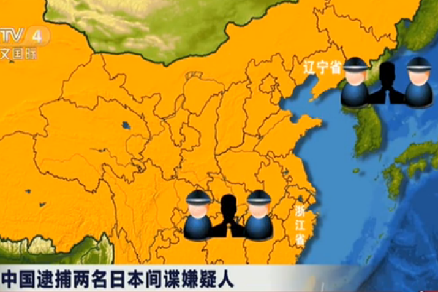

 |
A Japanese woman was detained in China in June on suspicion of spying, the fourth Japanese citizen to be held by Chinese authorities for the same reason, according to Japanese media on Sunday.
The woman in her 50s works in a Japanese language school in Tokyo, but the purpose of her visit to China is not known. The visit is one of several she had made to China, the Japan Times reported. She was arrested in Shanghai, but the charges against her have not been revealed.
The Asahi Shimbun reported that the detained woman is a native Chinese but had obtained Japanese nationality. At press time the Chinese foreign ministry had not yet issued a response.
Chinese authorities confirmed on September 30 that two Japanese on suspicion of acting as spies were arrested in China. The two men were believed to have been collecting information at the request of Japan's Public Security Intelligence Agency. One of them was being held in Northeast China's Liaoning Province, near the border with North Korea, according to Japanese media.
The other man was detained near a military facility in East China's Zhejiang Province. According to the Japan Times, another Japanese man in his 60s was detained in Beijing in June.
Japan's Chief Cabinet Secretary Yoshihide Suga denied that the Japanese government had sent spies to China in a press conference on September 30, saying "we have never done [such a thing]," the Asahi Shimbun reported.
Li Wei, an anti-terrorism expert at the China Institute of Contemporary International Relations, told the Global Times that Japan's dispatching spies to China is due to strained relations between the two countries.
Normally, the two countries would get to know each other through official meetings and other communications. However, with relations souring, Japan has resorted to sending spies to acquire information to serve its diplomatic and domestic policies, Li said.
Japan's policy with China is the other reason it sent spies to China, Liu Jiangyong, a professor with the Institute of International Studies at Tsinghua University, told the Global Times. The country has seen China as an imaginary enemy since 2012, and it holds a strong defensive mentality toward China, Liu said.
Li said military information is what Japan wants most, as they are eager to know China's military development and strategic deployment.
In recent years, Japan has also been paying increased attention to unconventional fields, collecting economic and environmental information, Li said.
Observers believe that the incident will further worsen the already strained Sino-Japanese ties.
 Winding mountain road
Winding mountain road
 Math teacher makes 'solar powered electric car'
Math teacher makes 'solar powered electric car' Heavy traffic turns expressway into huge parking lot
Heavy traffic turns expressway into huge parking lot Chinese-American girl selected as Rose Parade princess
Chinese-American girl selected as Rose Parade princess Top 10 nominated designs at BJDW
Top 10 nominated designs at BJDW Fashion show staged in Forbidden City at night
Fashion show staged in Forbidden City at night Construction of HK-Zhuhai-Macao Bridge enters final stage
Construction of HK-Zhuhai-Macao Bridge enters final stage Model of heavy-lift copter makes debuts at Tianjin expo
Model of heavy-lift copter makes debuts at Tianjin expo Art photos of Chinese beauty in Han Chinese clothing
Art photos of Chinese beauty in Han Chinese clothing Pushing back
Pushing back The secret rites of sky burials
The secret rites of sky burials Friendship mainstay of Sino-NK ties
Friendship mainstay of Sino-NK ties Life of a transgender singer in fast-changing China
Life of a transgender singer in fast-changing ChinaDay|Week